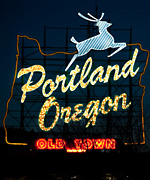 Saskia Sassen first coined the term “global city” in her book The Global City, published in 1991. She defined a global city as one that tangibly influences world affairs in terms of politics, culture, and various socio-economic means. John Jay, global creative director for Wieden + Kennedy, says that Portland is coming of age as a global city. Oregon Business web editor Emma Hall explores what that means.
Saskia Sassen first coined the term “global city” in her book The Global City, published in 1991. She defined a global city as one that tangibly influences world affairs in terms of politics, culture, and various socio-economic means. John Jay, global creative director for Wieden + Kennedy, says that Portland is coming of age as a global city. Oregon Business web editor Emma Hall explores what that means.
By Emma Hall
 Saskia Sassen first coined the term “global city” in her book The Global City, published in 1991. She defined a global city as one that tangibly influences world affairs in terms of politics, culture, and various socio-economic means.
Saskia Sassen first coined the term “global city” in her book The Global City, published in 1991. She defined a global city as one that tangibly influences world affairs in terms of politics, culture, and various socio-economic means.
At a recent City Club of Portland Bright Lights talk, global creative director for Wieden + Kennedy John Jay said that Portland is coming of age as a global city. What exactly does that mean?
Politics
In his 2011 State of the City address, Mayor Sam Adams called Portland “a small-and-scrappy, globally competitive city.” Despite its small size, Portland has been at the forefront of new laws that are being slowly adopted around the nation, especially in terms of “going green.” From banning plastic bags to rolling out a citywide food scrap composting program, Portland’s recent political moves are being exported to other cities.
Some might write off Portland political officials as being too quirky, but local politicians do sometimes practice what they preach. Portland’s city council is committed to the planned $62 million Oregon Sustainability Center, set to be the world’s greenest office building.
Even documentary filmmaker Michael Moore was impressed by the Occupy Portland protests he visited this past October, calling Portland “the seat of our new democracy.”
Culture
One of the most well-known examples of a Portland cultural export is the world-renowned Burnside Skatepark, the once-guerrilla, now city-approved public skatepark under the east end of the Burnside Bridge that has been featured in numerous videogames and movies, and draws skateboarders from around the world. It inspired many other cities to create similar skateparks for their own skateboarders, a subculture that spans generations, financial situations and racial differences in cities across the globe.
More recently, Portland culture is being exported through the weekly IFC show Portlandia. Catchphrases like “put a bird on it” have gone past Portland and made waves with viewers who have never even been to the satirized city. (I know I won’t ever be able to buy anything for my house or wardrobe with a bird on it, possibly ever again. Salon writer Erin Keane agrees: “‘Portlandia’s’ skit might be the first comedy sketch to have a big impact on America’s buying habits,” she says.)
Images of mustachioed, tall bike-riding, craft beer-drinking, free trade coffee-roasting Portlanders are being broadcast through viewers’ televisions nationwide, and the stereotype is resonating outside of Portland. Portlandia‘s season two premiere saw a 39% bump in viewers, and the resulting media attention only serves to further expand Portland’s cultural branding and export.
Socio-economic
In his November 2011 New York Times piece Generation Sell, Portland essayist William Deresiewicz wrote “the millennial affect is the affect of the salesman.” Though it may seem to Portlandia viewers that Portland is the place where young people go to retire, it actually is a place where young people go to start small, socially-conscious businesses. From food cart owners to chicken sitters, Portland is a hub for young people with an entrepreneurial spirit.
It’s not just food carts and two-person enterprises that are starting up in Portland, though. The Portland Seed Fund recently hit $3 million in funding to help spark the region’s startup community. The fund graduated its first class of eight startups in November, and already two of those companies have closed on financing rounds totaling $2.2 million.
Portland’s manufacturing and export industry is also poised for growth. Partially thanks to the Port, Portland is uniquely situated to increase exports in a time that many U.S. consumers are experiencing a shift away from wanting cheap imports and more towards buying American-made goods. (Think support for SolarWorld’s petitions against Chinese solar exports, or Keen Footwear CEO James Curleigh meeting with President Obama to discuss domestic manufacturing).
Portland’s exports make it second in the nation for its percentage of gross metro product. Currently, 126,000 jobs in the region are derived from exports. In industries like tech, software and athletic clothing, Portland is becoming a focal point for socio-economic global influence.
Portland may become a global city of the heels of guerilla skateparks and fake feminist bookstore owners, but more substantial exports like sustainable energy startups and tech companies are right behind them.
Emma Hall is web editor for Oregon Business.

